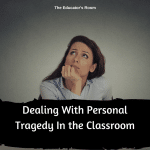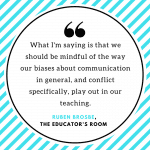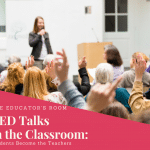Part of the thrill (and exhaustion) of education is having a community of different learners. Students in our classrooms have different needs. Most school communities have numerous resources, staff, time and energies spent on helping students who need extra help to reach grade level. Often, however, there are very limited resources for those students who are excelling above grade level. Too often they are given two options: read or do this extra work. These options do not push their learning. There are more things we can offer students on this end of the learning spectrum.
Students who make us think help us grow our teaching skills. I love when I have an opportunity to push myself as an educator to figure out how to help a student thrive. There is a space between “this is too easy” and “this is impossibly hard” called learning. Knowing the standards is not learning. Moving from where you are and pushing to understanding and application of new knowledge is learning. All students deserve to learn in every classroom.
Give them an extension of the subject matter being learned. Each year I have a handful of finishers. Students who complete assignments, tasks, projects and challenges quickly. They are taught to review their own work and then we have a system in place to practice the subject matter being studied. Too often early finishers are told to read. While silent reading is a wonderful skill, and one I would love to indulge in daily, there are meaningful things students can do when they are done. In my classroom students explore puzzles, use apps, play games and write responses to apply the learning happening in our curriculum. Finishers change as the subject matter and standards change. This system is taught to all of my class and anyone how is “done!” gets to push themselves using the materials we have in our room. Learning is never “done”!
Use their natural curiosity. Each year I also have one or two questioners. Before students start working I always ask, “What do you need to know to be successful with your learning?” BOOM! My questioner’s hand shoots up. We all have students who want to know more and will take an idea down a path you had not ever considered. With the technology available today there are many options for questioners. We have 2 computers and 3 iPads available in our room. We also have print dictionaries and sets of encyclopedias. Students are taught to use these resources to answer questions. Understanding the standards and curriculum are necessary, but oftentimes students are able to explore and research and find information about the standards that goes beyond your curriculum. Take this natural curiosity and allow students to research and respond to show their knowledge. Excitement is infectious and often times their passion will hook another student’s interest. When learning continues outside of your classroom door that is true success in teaching.
Push them outside of their comfort zone. Each year I have a student who has not been pushed. Things have often come fairly easy and they transfer information quickly making learning mundane. I use challenge puzzles for these students. A few of my favorite resources are Super Teacher Worksheets, Sudoku, Mindware, and riddles. These things push them to a level in front of frustration, but beyond their current knowledge. Sometimes I have to have a private conversation with the student about effort. They may need encouragement in the beginning. My student this year raised her hand when working to repeat every direction to me. “So, does it say…” and she would parrot back the direction. I reassured her for a bit and then after a week or so I said, “You don’t need me for this. All I do is stand her and say, ‘Yes!’ You have a yes inside of you. I want to come over when you actually need my help.” She still needs me to touch base on some challenges, but she is doing a better job finding her own yes inside. Students on this end of the learning spectrum may not have had to persevere at a task. Providing them with meaningful learning not only increases their knowledge, it teaches important life skills.
When students complete work quickly and master skills it is easy to just give them more. We often have them do the next set, read another page, or write another story. Every child in our classrooms deserves the right to learn. It is our job as educators to push them. To provide meaningful experiences for them. To teach them the habits of perseverance, thinking creatively and metacognition. Students in our classrooms have different needs. There is more we can do for students than give them more work.





